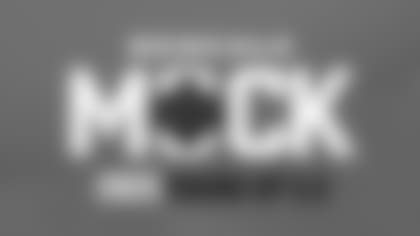What the NFL Network's Mike Mayock calls "a quarterback frenzy" and what *Sports Illustrated *terms "a quarterback quandary" is a high-risk brew of intrigue, excitement and danger for a Bengals franchise seeking Carson Palmer's successor.
Just in the last 24 hours there have been breathless reports of offensive coordinator Jay Gruden's undying love for TCU's Andy Dalton, Mayock's analysis that Auburn's Cam Newton could be there for the Bengals at No. 4, and the Bengals going to the hometown of Florida State's Christian Ponder for a private workout in Dallas on Friday.
And ProFootballTalk.com reported early Thursday morning the Bengals are also going to work out Dalton in their bid to fill the Texas-sized hole at quarterback.
The buzz is now a buzzsaw. All top seven quarterbacks have the dents of a used car lot. But all seven also have certain accessories that belong to franchise quarterbacks. With the NFL frozen by a lockout, the only way for teams seeking starting quarterbacks to get their man is to gamble on a kid. In what has become a flat-out scare, the Bengals wonder if six will be gone by the time they pick in the second round at No. 35.
Not even the Hall of Fame class of 1983 did that. But suddenly Missouri's Blaine Gabbert at No. 4 could be the last port in a very rocky storm.
So maybe it's time for some perspective from an old-time quarterback hunter. Former Bengals head coach Sam Wyche helped dig up three Pro Bowl and Super Bowl quarterbacks from the '80s, '90s and '00s in Joe Montana, Boomer Esiason and Trent Dilfer. And while it's a different era, he says the traits are the same.
"There may be different questions in some of the issues, but it's still pretty much the same thing," says Wyche, who briefly tutored Tim Tebow before last year's draft. "There are two things if they don't have you better run away from them: accuracy and smarts. They've got to be able to get the ball there and they've got to be smart enough to learn and memorize adjustments.
"OK, issues have changed, like what do you do against the zone blitz? But it comes back to the same thing: smarts. They've got to be poised enough to spit it out within 40 seconds."
Different eras? While the Bengals have visited and hosted the top five candidates and coached the other two at the Senior Bowl, Wyche picked Montana's brains on a park bench and worked out Esiason by himself in a session he served as scout and receiver.
But in any era the key for Wyche is to take the guy with "the least downside."
"He can't have too many things that can go downhill on you," Wyche says. "If you've got a guy that has some red flags but you're saying you absolutely have to have him, you have to be careful nowadays. You just can't make a mistake. It puts you in a valley for too long. Go with the smart guy with the pretty good arm even if he's not that big. Drew Brees.
"Then you can go down the list of things that can help. If he's tall, that's good. If he can run, that's good."
But, yes, from Tom Brady to Montana to Unitas, some of these things just can't be planned.
How about Montana? Wyche laughs.
"There are 10 different stories," he says. "Here's mine."
In 1979, Wyche was in his first year of NFL coaching and it was under first-year 49ers head coach Bill Walsh, his own quarterbacks coach with Paul Brown's original Bengals. The Niners were scratching out of a 2-14 rubble without their first-round pick, traded to Buffalo for a guy who once played running back named O.J. Simpson.
"It was 10 days before the 1979 draft and Bill wanted me to go down and work out James Owens at UCLA because we were going to take him with our first pick and that was in the second round," Wyche says. "He was a receiver, running back-type, but I needed someone to throw to him. So I went through a list of college quarterbacks that were living in Manhattan Beach that our scouts put together and Joe was there at the time. He showed up with his wife and she was sitting in the stands. After he threw about three balls I started watching him more than James Owens."
After the workout and the Park Bench Summit with Montana, Wyche went back to tell Walsh that Owens didn't look all that great but the guy they should take with that second-rounder was Montana. That didn't fit at all with what Walsh wanted to do, which Wyche says was use the third-round pick on the quarterback he just left at Stanford, Steve Dils.
But Walsh agreed to accompany Wyche a few days later back to UCLA to watch both Owens and Montana again.
"His accuracy was so good; he threw a great ball, so good and easy," Wyche says of Montana. "It arrived softly. He didn't have a rocket arm like Dan Marino or Brett Favre. He had different speeds, but it always got there and it was an easy ball to catch. He had great feet and natural hips. He had a great feel for it, even the way he turned his head and shoulders so he could see downfield. And when I sat down on the bench and quizzed him, he had good football understanding. He understood how defenses worked—that's always important—and he understood strategy."
Walsh must have seen the same thing, although Wyche thought Owens looked worse than before with some easy drops. On the plane ride back to the Bay Area they sat across the aisle from each other and as the plane took off Wyche says Walsh leaned over and told him, "When we get back I'm going to tell the staff we're going to take Owens in the second and Montana in the third."
"This was new to me so I wasn't all that sure but I told him, 'Shouldn't we take Montana in the second?' and Bill just said, 'He'll be there,' " Wyche recalls.
And the greatest quarterback who ever lived (many say) was.
The 82nd pick.
"It wasn't that much of a crapshoot because he was supposed to go in the third round, we just cut it close," Wyche says.
But enough of a crapshoot that Dils went in the fourth round to the Vikings and ended up with a career record of 10-17 as a regular-season starter. Montana was 16-7 in the playoffs.
Enough of a crapshoot that five years later in his first season as Bengals head coach Wyche went to East Islip High School to work out Esiason, Maryland's Long Island quarterback. Told that Esiason says only one NFL coach worked him out after the scouting combine and before the draft, Wyche says, "That was me and it was a miserable day."
"Cold, windy, and I had to be his receiver," says Wyche, speaking in an era now when workouts are televised like playoff games. "That's tough because I couldn't really see his mechanics, but I knew he could throw hard, so you can imagine what I looked like trying to catch it. And, really, we already knew we liked him. That trip was just a confirmation to make sure he was healthy."
Wyche credits then-Bengals assistant general manager Mike Brown for making the call on Esiason.
"He said that's the one guy we needed to get out of that (1984) draft and he was right and we got him in the second round," Wyche says. "The one thing you knew about Boomer is that he was a field general."
Brown has often said he liked Esiason's height and size (6-5, 220) and he compared his arm strength to Palmer's. He also loved Esiason's competitive spirit, recalling he saw him play against Andrew Luck's father Oliver when Maryland played West Virginia and he came back in the game despite getting racked up early.
"He wasn't all that accurate, but you had to admire no matter how things went against him he kept going at it," Brown has said. "At that time, all we knew is that he was on top of things as far as knowing football. But he ended up being what I consider a football genius."
Wyche selected Dilfer with the sixth pick in the 1994 draft when he was the head coach of the Buccaneers and while he went to the 1997 Pro Bowl with the Bucs and was the caretaker quarterback for the 2000 Ravens Super Bowl champions, Dilfer didn't hit the standard Wyche sets for No. 6 picks.
"A good player, but you have to be a perennial Pro Bowler there to be of value," Wyche says. "He became a good player. I guess he had bad coaching early on in Tampa. He had a great college career. When we got to working him out he had the Terry Bradshaw (quick) release and he was a big kid. Not as big as Boomer, but bigger than the average NFL quarterback. Trent wasn't ready in terms of knowing the game like those other two guys. I played a round of golf with him and got a good feel for him."
More crapshoot. The Bengals, picking No. 1 that year also had a meeting with Dilfer at Fresno State. He turned off head coach Dave Shula and offensive coordinator Bruce Coslet when he cut short the session, breezily announcing he had a tee time.
Maybe it was with Wyche.
"He eventually came on, but it took awhile and it usually does," Wyche says. "How many quarterbacks come into the NFL and win right away? I'm not talking about coming in and playing because there's nobody else. I'm talking about winning right away. There's not too many Dan Marinos. Even Joe. That first year we picked out spots with him."
Before Montana went 13-3 in his third season and won a Super Bowl, he was 3-5 as a starter. All of which isn't going to make impatient Bengals fans happy. The trend now has gone away from a rookie like Palmer sitting behind a veteran in Jon Kitna even though he was the No. 1 pick in 2003. The last two overall No. 1s, Sam Bradford and Matthew Stafford, have plunged in right away. They haven't won but have steered bad teams on to the right course.
"I think there's been a need at the position, unlike there has been for some time," says ESPN analyst Jon Gruden, another quarterback guru that followed Wyche in Tampa Bay, on why young quarterbacks are being pressed into service.
"I think if you look at the top 14 or 15 teams that are drafting at the end of the month, you could say that all these teams could use a quarterback. When there is a tremendous need and you get a quarterback early in the draft, sometimes that quarterback's better than the ones that you currently have on your roster. That is the big reason. There is a need for young quarterbacks to come in here and play.
"We just lost Kurt Warner two years ago. We're losing Brett Favre this year. Carson Palmer right now, his status is unknown whether he's going to play again. Somebody's got to replace these guys. And if they don't have that quarterback in-house to do it, it's going to be a young guy from the draft. So I think that's the big reason."
Gruden, on an ESPN conference call earlier this week promoting his "QB Camp" segments, may be a good guy to gauge what the Bengals are thinking because not only is Jay Gruden his brother but they favor the same kind of West Coast offense. Except Jon Gruden doesn't tip his hand. He loves them all, but he does a nice job breaking them down.
(ESPN airs the special at 7 p.m. Thursday.)
As for the 6-1, 215-pound Dalton, Gruden knows the kid has been ripped for a lack of arm strength but he says he can make every throw with the ball now in the middle of the field. Yet like Newton, Gabbert and Nevada's Colin Kaepernick, Dalton comes out of a spread offense and Jon Gruden says those guys are going to take time to adjust.
Dalton does have the two Wyche ingredients of accuracy and brains, and so does the 6-2, 220-pound Ponder. That's another guy that doesn't have the arm strength, which didn't bother Wyche on Montana.
(The Ponder and Dalton workouts just didn't happen. It's believed they have been scheduled for awhile, coming at the end of a process in which the Bengals visited and hosted all but Locker and Kaepernick, two guys they know well from coaching them at the Senior Bowl.)
"Here's a guy that is a three-year starter. He's won 22 games at Florida State, Senior Bowl MVP. He's already graduated. There are a lot of upsides here," Gruden says of Ponder. "He's had some injuries, which are the big concern. He's a great leader. Two-time team captain of the Seminoles. Two years ago he threw for almost 70 percent. I think the injuries (broken shoulder, arm) got to him a little bit this year.
"But I think he's an accurate, intermediate passer. People want to see him push the ball maybe a little more down the field. Like to see a little more arm strength. But I think those things will develop and come to Ponder when he gets healthy and continues to physically get stronger. He's a very good collegian. He's got good enough size, good enough mobility."
But the best athlete of all of them besides Newton is the 6-2, 230-pound Locker out of Washington. That may be a guy that Wyche would stay away from because of his inaccuracy and even Gruden says that some of it can't be cured.
"He does have to improve his accuracy, but I think when you're hit a lot and asked to do as much as Locker's been asked to do, sometimes your fundamentals wane a little bit," Gruden says. "They disappear in key situations. He does have a good, strong arm. He's an outstanding athlete. He's got very good elusiveness and straight-line speed with some power, and I think he loves football.
"I just think he needs to go back and reestablish his fundamentals and work hard at that. He'll get the right position coach that's going to help him do that. But accuracy sometimes can be terminal. Sometimes you can't cure that. I think that is a big concern with Jake Locker, because he does miss some throws."
Gruden loves the big arm of the 6-6, 240-pound Ryan Mallett, as well as the pro style of offense in which he played. The scouts say Mallett is football knowledgeable and he's got the Boomer size, but not nearly the mobility. His glacial 40-yard dash has scouts nervous against NFL pass rushers and some wonder if there are too many of Wyche's red flags after the reports that Mallett admitted at the combine to some teams of some drug use.
"Obviously that's a red flag if that's the truth," Gruden says.
But remember the Marino off-field whispers? Newton has character questions, too, but what's the difference on the field between him and Tebow? About 40 games because Newton played just 14 at Auburn and Gruden was caught musing, "I'd like to see more of Cam Newton."
Wyche, by the way, isn't all wrapped up in the spread stuff. He thinks if teams get an unfettered look at a guy at the combine and Pro Day, they can tell if he can make the switch. He thinks Tebow is going to be an excellent pro because he's smart, has a strong arm, and even though he's not fast he's mobile and savvy with the ball. Newton is faster and more explosive, but how often does a college quarterback who runs half the time make it in the pros?
As one scout offered recently, "The NFL is still a throwing league. How else do you win a game in the last two minutes?"
Even though Newton's one-read-and-go gig in the Auburn offense has drawn criticism, Gruden staunchly defends his ability to make checks and formation calls after sitting down with him.
And there's this: Wyche remembers Esiason being furious the Bengals got him with the 38th pick.
"He thought he was going seventh. He was not a happy camper when I called and told him we drafted him," Wyche says. "He said, 'We're going to show the rest of the league they made a big mistake.' "
It sounds like that's what Gruden felt from Newton.
"I just like the look in his eyes, the eagerness and feeling that he has a lot to prove to everybody including himself," Gruden says. "I think Newton impressed me the most in that regard."
But do the red flags bring it back to the 6-5, 235-pound Gabbert if you're the Bengals? He seems to have Wyche's smarts and he did complete 63.4 percent of his passes in 2010.
Still, the scouts hammer his uneasiness in the pocket against the rush. Happy feet, they say. They also crush him for the short routes the Tigers run, although he did average 7.4 yards per his 920 throws in 2009 and 2010.
"I do think Blaine Gabbert is a top 10 pick," Gruden says. "All you have to do is see the ball come out of his hand. He's got a very quick, strong arm, prototype size. He's over 6-4, 235 pounds, a finance major, so you know he has intelligence. He has speed. I mean, Gabbert ran very well at the combine. He's elusive back there. His scrambling and playmaking ability I think will be very enticing.
"Once again, here's a junior quarterback that comes from a very unique, different style of spread offense at Missouri where he's been in the no‑back set, and the shotgun predominantly. But I think his physical talents are very noticeable to everybody."
Maybe the Bengals should send Wyche to run some routes for Gabbert, or talk to Newton on a park bench, and forget all the QB camps, the mock drafts, and weight-room cam at the combine.
Or maybe they should just remember the words of an old quarterback hunter:
"The least downside."













